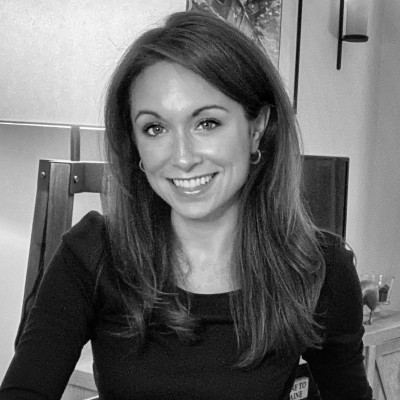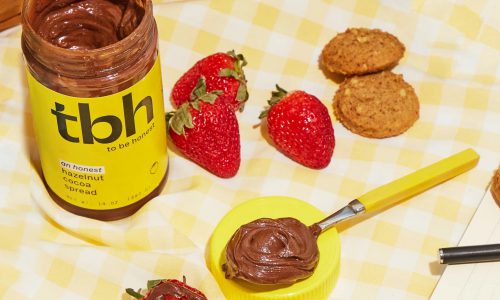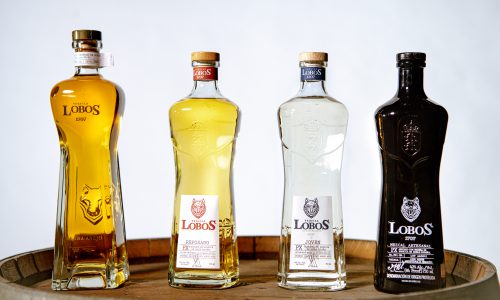Diego Osorio didn’t set out to create an award-winning tequila that brings people together. Instead, it happened organically. It was a natural evolution of his creativity, family history, and passion for storytelling that culminated in the creation of Lobos 1707.
As the Founder and Chief Creative Officer of a unique tequila that blends heritage and innovation, Osorio is carving out his own niche with Lobos 1707. With an investor board stacked with heavy hitters like LeBron James and Paris Hilton, and a winning formula that’s received dozens of industry awards, we caught up with him to learn about what makes Lobos 1707 so special and how he’s built a bigger table to make the industry more inclusive.
Watch the interview with him and read the full transcript below.
Rebecca Fryer: I’m really excited to dive into the story because we had the privilege of interviewing your CEO earlier this year, Dia, who’s phenomenal. So we got a taste of what the tequila was like but we want to hear more about the team building and the story behind it.
So maybe we start there and we start with your background. And I know family legacy plays into the story a little bit. So I’d love to hear from you — tell us more about what inspired you to create this tequila?
Diego Osorio: Our family has been in the wine and spirits business for a very long time. I always wanted to work in film and was never allowed. So I had to do finance. I studied finance in college, moved to New York to finally do acting about 15 years ago, and have very happily been doing that for 15 years professionally now — both directing and acting.
But this was something that I knew how to do and also be creative. This was another way of storytelling and my cousin was actually the one that really pushed me to do it. He was like, ‘Hey, why don’t you view this as another form of storytelling? You can tell it on a canvas or you can tell it on a screen, or you can tell it on a bottle.’
And well, that’s really interesting, but is there a story here to be told? It had to be tequila if I was going to do anything. Tequila’s my poison of choice. And also, people tell you that you better really like your product because you’re going to be trying it a lot. It is not an understatement. I went into it thinking that’s something that people say but once you actually are into it, you’re like, ‘Oh, it’s 8:30 in the morning and I’m doing a Zoom and it’s five o’clock where that Zoom is so I better be drinking my product.’ But not that I recommend that. Drink responsibly.
It’s important that you do like your product. Tequila was the obvious choice and I had a great-great-grandfather, one from Spain and Mexico, but it’s one of those stories that you know your family tells and you’re like, sure that’ll be useful never, and actually, it turned out to be. I started digging. His name was actually Diego Osorio and, as an artist, I’m a big believer in science. So I was like, well, that’s really interesting. Would he experience tequila? How he would have experienced tequila? And then I found out that he would take the same wine that we still produce today — the same sherries, the brandies that my family produced that I have nothing to do with and he would take those barrels with him to Mexico and drink them. And then he would fill them up with the local agave spirit — what we know today as tequila. And obviously knowing the industry and growing up around it, I was like well, that’s really interesting. Those sherry finishes that we produce that we see in the high-end bourbons and the high-end whiskies and that kind of thing. Could we do that finish in tequila? Is that an exercise that is worth exploring? People think it’s a marketing plot or a marketing line. Really this was just for fun, for friends and family, just to be creative on the side and then it kind of snowballed.
RF: I know this liquid is so special to you. So what makes it the formula that it is? How did you define the winning formula?
DO: Sometimes it’s better to be lucky than good. And I think I was lucky to know the right people who had their own voice. Meaning, if I had to bring a sherry finish, I had to bring someone who really knew how to make sherry. Because it’s always shocking to me — growing up I saw a lot of the brands that come to my family and buy those barrels and they don’t really ask a lot of questions. They don’t really interact. They just sort of come get the barrel, get the certificate, and fly out.
The master distiller down there has been doing sherry for 40 years. I was like, I would want to talk to him. I want to know about it. Like what is this vintage like? There are so many questions that I would have and because I couldn’t ask all those questions, what I did is I took a ‘paid vacation’ because I had no money. I stole 20 barrels from my family, shipped them to Mexico, and then I worked with the master distiller from Mexico.
So, that’s why I say it’s better to be lucky than good is because these three very hard-headed opinionated Latin men getting together and bucking heads and thinking and defending what they thought was the right percentage of their finish, or their touch, or their heritage. That friction is what made the liquid really special.
And probably, if we were all more diplomatic, there would have been fewer iterations. But the iterations made the tequila what it is. There were packs of about 15 to 20 different samples and we would pick winners and understand what was the aging, the oxidization, the amount of time in one barrel, the amount of time in the other barrel, the fermentation process. So it really took a lot of time. It was a beautiful time and looking back, it was just so beautiful and pure and I think that translates to how it’s perceived out in the world.
That kind of friction and that kind of love for the liquid… it translates in the bottle I think.
RF: Tell us about how you approach team building and what qualities you look for in new hires.
DO: I’m a big believer that if it’s a person who cares and who feels like family and it feels like we’re rowing in the same direction, the résumé and the expertise and that kind of thing will come. I might be naive about it, but I think we are 50-something people now, depending on where you put the line at Lobos and it does feel like a big family and we’ve been hiring in that process.
And yes, there’s expertise and there’s a gap to fill but we care about diversity, we care about values, we care about trust and family and we have an internal motto which is the strength of the pack is the wolf and the strength of the wolf is the pack, which sounds a little cheesy, but it is something to live by. You are as strong as your weakest link and you are as strong as your whole pack as an individual. So hiring is just part of that process.
It’s chemistry, obviously knowledge and that kind of thing, but I do feel like a lot of it is so unique to its position and every company is so different and every aspect is so different. If they want to grow into a role, then it’s very special.
I’m not big into titles so as quote-unquote ‘founder’ I was like, I don’t want to be CEO. I want to be someone who hopefully does what he does best, which is I’m a product nerd, and I’m a creative and an artist. So let me work in what I think I do best which is the creative and the storytelling and the brand imaging and product, and then I hired the best possible person as CEO, which we were so lucky to get Dia.
We went out to a few people who we trusted and then I ended up meeting with a few and Dia was just overwhelming the right person.
RF: I know you have the wolf pack, which you mentioned. You also have a really great brand mantra: ‘building a bigger table,’ which is really about making the industry more equitable and inclusive. So tell us a little bit more about that. What does it mean to build a bigger table and where did that come from?
DO: Well, it came from my Covid experience. I was building an office where we have a stage and a bar. We worked from this really big table that I physically built with a friend during Covid and people used to say you’re building a really big table. I’m like ‘Yeah, we’re going to need it.’ And it became this sentence and then one day when we were thinking about it, we were like, ‘Oh no, that’s what we are about,’ and to your point about the wolf pack, every person that comes on believes in that.
Everyone’s welcome at our table. Doesn’t matter what you look like or what you believe in. And if there’s not enough room, we’ll build a bigger table.
RF: So tell us a little bit more as it relates to hiring and talent retention and acquisition. I know that the team is about 60 percent female-led, which is extraordinarily rare in the spirits industry, which is traditionally male-dominated. Did you proactively create a strategy around this? How have you been sourcing talent? Tell us a little bit about that.
DO: So I come from a family of three sisters and a mother and I think it’s a great environment. I’m definitely not afraid of that environment, which I think other people are, unfortunately. When we talked about diversity, it couldn’t be just ethnicity. It had to be everything or every aspect of it. If you’re only picking one lane then you’re, by definition, not being diverse. So, we started with Dia and our investor group and we are a 70 percent diverse-owned company. So our workforce had to be the same way. You have to lead by example, in every shape or form, and to your point of hiring, at the beginning, it was just very, very natural and it just came to be and now it’s a little more thoughtful. We especially look for those people who have maybe less percentage of an advantage than other cases may be.
RF: Well, you’re definitely living the mantra of building a bigger table and bringing a lot of different people together. And speaking of diversity, your investors are also very diverse. I think you’ve covered a lot of different industries. You have Paris Hilton, LeBron James, of course, Drake. And then I also believe Lindsey Vonn, right? That’s a sampling of your investors.
DO: We also have Arnold Schwarzenegger, we have Jimmy Iovine, we have Draymond Green, we have John Wall. We have great people and it just organically happened that they all invested in the company, and they all are incredible business people themselves. I don’t think you achieve a lot of the names we just said — they are literally the best at what they do — and you don’t achieve to be the best at what you do by just being one aspect of your life. I think they bring that mentality to everything they do. So they help us in that same mentality.
RF: Aside from having a very exciting investor board, you’re in a very exciting sector of the industry. Tequila has been for the past however many years, the fastest growing spirits category consistently. Everyone’s drinking tequila. Everybody has a tequila. Celebrities are all about it. So tell us what industry trends you foresee taking shape. Is this momentum going to continue? Where are we headed with tequila?
DO: I definitely see tequila not going anywhere. I think people are learning more about tequila. We have a joven instead of a blanco and since we launched, there’s a huge amount of people actually asking me to tell them more about joven and what it means. People really care. I think consumers are really smart in general. I think audience or consumers, I never treat them as ‘Oh, they don’t know, they don’t care.’ I’m quite the opposite mentality. They’ll catch up if this is a coming trend, there’s a huge part of the community that will learn about this and care and so you can’t fool them.
Another trend I’m really excited about is what’s happening in gin. I think that gin is a great category. Being Spanish and being in Europe we’ve been drinking gin for a long time — it’s kind of like outdoor seating during Covid. Everyone’s like, ‘Oh my God, this is great.’ And I’m like, ‘Yeah, we’ve been doing this for a long time.’ Gin is a little bit the same thing. It’s like, ‘Oh my God, gin and tonics are great,’ and you’re like, ‘Yeah.’ But I feel like the U.S. is catching up with that which is great.
And also I’m very excited about the cognac and brandy category. You see brands like D’USSÉ doing such an incredible job. I mean, LOUIS XIII can’t make it fast enough. And I’m a big believer that a lot of these trends start with the African American community. And I think what they did to Champagne in the early 2000s, they’re about to do to brandy and cognac. And actually to your point of fortified wines, I’m a big, big believer and a big lover of
those kinds of wines.
RF: So fast forward, maybe three to five years, where’s Lobos tequila? What excites you most? Where are we going and what keeps you up at night in a really exciting way?
DO: So I get asked that question quite a bit. It’s really important to me to not sell out the brand. It’s so easy to. There are always opportunities to be like, ‘Oh, this is 10,000 cases if you do this,’ and you’re like, ‘No, that’s not us.’ We can’t do that. And I’m a big custodian of that. And hopefully, my justification for that is that we’re building a brand we’re not building a moment. So hopefully, that pays off.
The other part, to your point of values and that kind of thing, that’s a huge part of us. I’m a big sneaker lover, for example. But Jordan Ones, when Jordan did what he did, when you were a kid in the 90s and you were wearing them, and then a kid would like nod at you and then you both knew you shared something, which was a set of values, ‘against the man,’ or whatever the slogan was at the time. And I would love it in three or four years from now for someone to order a drink of Lobos at a bar and another person hears it and they know they share more than their tastes in tequila. They share a little bit of… they have that nod, they share that kind of, ‘Oh we stand for the similar thing.’
RF: I’m really thrilled that we had the chance to catch up today and look forward to keeping the conversation going.
DO: Yeah, anytime.
Learn more about Lobos 1707 here.






